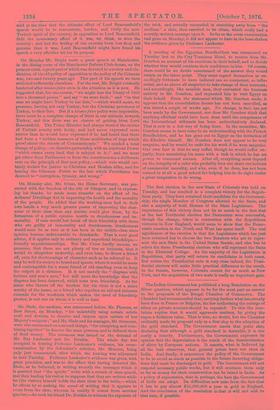On Monday also, Mr. Cross, the Home Secretary, was pre-
sented with the freedom of the city of Glasgow, and in express- ing his thanks, he made some remarks on the effect of the Artisans' Dwellings Act in improving the health and the morality of the people. He added that the working-men had in their own hands a very much greater power of improving the char- acter of their class than any statute could give them, by the formation of a public opinion hostile to drunkenness and im- morality. If men would but break off their friendship with those who are guilty of immorality and drunkenness, drunkenness would soon be as rare as it has been in the middle-class since opinion became unfavourable to drunkards. That is very good advice, if it applies only to ordinary and superficial friendships,— friendly acquaintanceships. But Mr. Cross hardly means, we presume, that there are not plenty of ties so intimate, that it would be altogether unworthy, and even base, to throw a friend off, even for shortcomings of character such as he referred to. It may be well for society to brand and ignore, where it would be mean and contemptible for a warm friend of old standing even to keep the culprit at a distance. It is not merely the "disgrace with fortune and men's eyes," but still more the knowledge that the disgrace has been deserved, which tests true friendship. As the sister who throws off the brother for his vices is not a sister worthy of the name, so a friend who repulses an old and intimate comrade for the weakness which makes the need of friendship greater, is not one on whom it is well to lean.


































 Previous page
Previous page